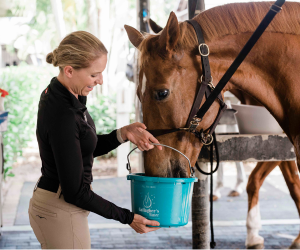Depo Is Banned. Now What?

Mary Babick hasn’t had medroxyprogesterone acetate in her barn for some time. And for a good reason. The U.S. Hunter/Jumper Association President said she’s learned over the course of her career there are better ways to do right by the horse than relying on prescription drugs.
“After the USEF hosted that forum, we had a serious talk about it in my barn,” said Mary, who is also a USHJA certified trainer at Knightsbridge Farm in Atlantic Highlands, N.J. “We asked ourselves, why are we giving this to horses in the first place?”
Earlier this month, the USEF banned medroxyprogesterone acetate, also well known under the brand name, Depo-Provera, for use in horses.
More Training, Less Sedation
“We had a mare on it my barn for some time, but we took her off it when it was questionable if the drug was really helping her,” Mary explained about a jumper mare she owned. “We’d heard the rumors of horses dying on Depo. And I’m not willing to risk her life just to be better at a horse show.”
In the end, better training helped the mare become more rideable, Mary explained.
“There is no substitute for training,” she said. “And there are horses who compete who just don’t like their jobs. Not every horse is cut out to be a show horse.”
There are plenty of riders who are looking for alternatives to Depo, now that the USEF has announced the ban. There are a slew of calming supplements on the market, but Mary still thinks jumping from one product to another to alter an animal’s behavior isn’t the answer.
“The way I know not to do it is because I used to do it. When we know better, we do better.”
“We shouldn’t be sedating horses to make a person’s life better,” Mary said, coming back to her mantra of proper horsemanship and training. “There is a certain quality we admire in school horses, in that they can tolerate beginners. A show horse isn’t going to tolerate them. We shouldn’t make the world fade away for a the horse because of that.”
She equated the situation to people who take prescription medication to help them focus.
“But the difference is, the horse doesn’t have a choice. They take whatever you give them,” she described.
Putting The Horse First
Which is why Mary thinks that “anything that has the chance to kill a horse is something we shouldn’t use.”
Mary said she came to this conclusion after looking back at what she’d learned over the course of her riding and training career. She said she doesn’t judge others for using sedatives or drugs, as she once did as well. But Mary said she now knows better, and that’s the difference.
“The way I know not to do it is because I used to do it,” she admitted. “When we know better, we do better.”
Mary said she relies on her veterinarian to inform her on medication needs for the 40-plus horses at her farm. Those horses are owned and ridden by amateurs and juniors of all levels. Her vet, who specializes in treating horses on the race track, errs on the side of less medication.
“He’s used to the high scrutiny of the racing world. I was mad at him for it,” Mary recalled. “He helped us transition to be a farm where the only prescriptions we have are banamine and maybe a sedative for clipping.”
It took some time, but she said she’s not mad at him anymore.
“I have to explain this to people when they decide to come here,” Mary said of her farm’s drug protocol. “Some people aren’t OK with how we work here, and that’s fine. But the customers who are OK with it are the kind who want to learn how to ride. And I think that’s a wonderful thing.”


